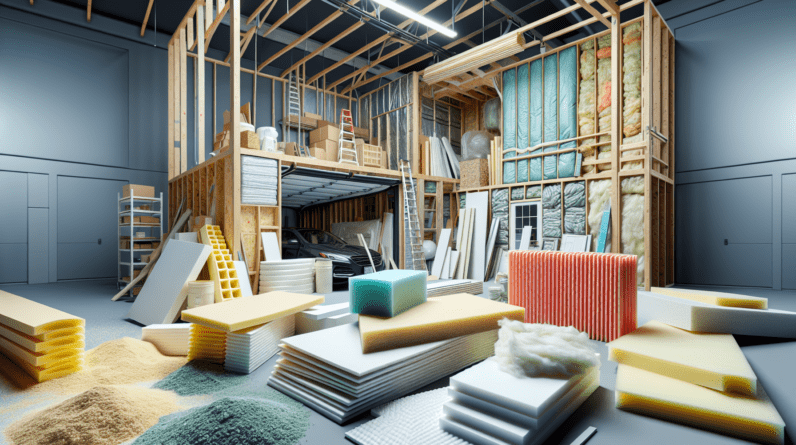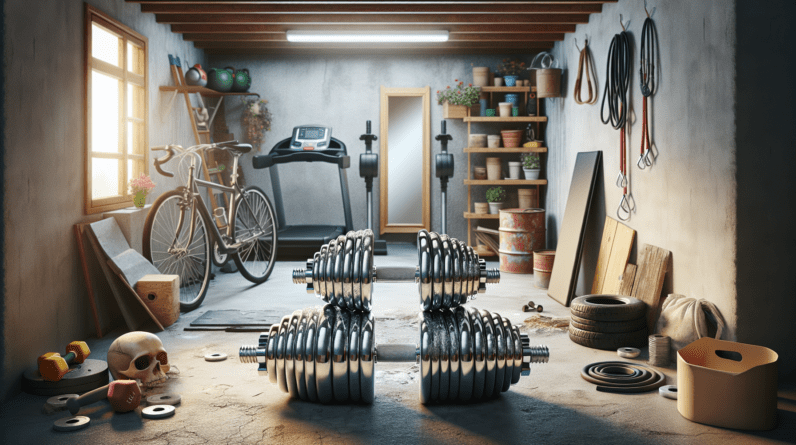
If you’re considering converting your garage into a cozy living space, one of the most important factors to consider is insulation. The right insulation materials can make a significant difference in maintaining a comfortable temperature and reducing energy costs. From my experience, there are a few standout options to consider. Fiberglass insulation is a popular choice, known for its affordability and effectiveness in preventing heat transfer. Another excellent option is spray foam insulation, which not only provides excellent thermal insulation but also helps to reduce noise. Lastly, rigid foam insulation boards are a durable and efficient choice, providing superior insulation properties. By choosing the right insulation materials, you can ensure a comfortable and energy-efficient space for your garage conversion.
Choosing the best insulation materials for a garage conversion
Importance of proper insulation in a garage conversion
Converting a garage into a usable living space is a great way to maximize the square footage of your home. However, one important aspect that should not be overlooked is insulation. Proper insulation plays a vital role in ensuring the comfort, energy efficiency, and durability of the converted space. It helps to regulate temperature, minimize heat loss, control moisture, reduce noise, and enhance the overall livability of the area.
Factors to consider when selecting insulation materials
When it comes to selecting insulation materials for a garage conversion, several factors need to be taken into consideration. These factors will influence the effectiveness of the insulation, as well as the long-term performance and sustainability of the space. Some of the key factors include:
Energy efficiency
Insulation materials vary in their ability to resist heat transfer. The energy efficiency of the insulation is measured by its R-value. The higher the R-value, the better the insulation’s ability to prevent heat flow. Therefore, it is important to choose materials with a high R-value to maximize energy efficiency and reduce heating and cooling costs.
Moisture resistance
Garages can be prone to moisture issues, such as condensation or water leakage. It is crucial to choose insulation materials that have good moisture resistance properties. Moisture-resistant insulation will help prevent mold growth, rot, and damage to the structure, ensuring a healthier and longer-lasting space.
Ease of installation
The installation process can greatly affect the efficiency and cost-effectiveness of insulation. Some materials require professional installation, while others are suitable for DIY projects. Consider the complexity and ease of installation when choosing insulation materials for your garage conversion.
Fire safety
Fire safety is an essential consideration when selecting insulation materials. Opt for products that have a high fire resistance rating to protect your property and ensure the safety of its occupants.
Cost-effectiveness
Balancing insulation performance with cost is crucial in any garage conversion project. Look for materials that provide a good combination of insulation properties and affordability. While initial costs are important, also consider long-term savings on energy bills and maintenance.
Insulation options for different areas in a garage conversion
Insulating the various areas of a garage conversion requires different types of insulation materials to address specific requirements. Let’s explore the options for each area:
Walls insulation
Insulating the walls of a garage conversion is essential for temperature regulation and noise reduction. Batt insulation, such as fiberglass or mineral wool, is commonly used for walls. These materials are affordable, easy to install, and offer good thermal and sound insulation properties.
Ceiling and roof insulation
The ceiling and roof of a garage conversion are key areas that can contribute to heat loss if not properly insulated. Spray foam insulation is an excellent option for ceiling and roof insulation. It provides superior thermal insulation, seals air leaks, and offers excellent moisture resistance. Other options include rigid foam insulation and blown-in cellulose insulation.
Floor insulation
Insulating the garage floor helps prevent cold air from seeping into the living space and adds a layer of comfort. Closed-cell spray foam insulation or rigid foam insulation are popular choices for garage floor insulation. These materials provide excellent thermal insulation and moisture resistance.
Why insulation is crucial for a garage conversion
Insulation is crucial for a garage conversion for several reasons. Firstly, it helps prevent heat loss during the colder months and keeps the space warm and comfortable. Proper insulation ensures that the converted garage remains energy efficient, reducing the need for excessive heating and subsequently lowering utility bills.
Furthermore, insulation plays a significant role in noise reduction. Garages are typically more exposed to outside noise compared to other areas of a home. Effective insulation materials can help minimize external noise, creating a quieter and more peaceful living environment.
Insulation also provides protection against moisture and condensation. Garages can be prone to moisture buildup, which can lead to issues such as mold and mildew growth. Proper insulation with moisture resistance properties helps prevent these problems, maintaining a healthy and durable living space.
Benefits of effective insulation
Effective insulation in a garage conversion offers numerous benefits. It not only enhances the comfort and livability of the space but also provides tangible advantages such as:
Preventing heat loss and energy efficiency
Properly insulated walls, ceiling, roof, and floor minimize heat loss and transfer, creating a well-insulated and energy-efficient living space. By reducing the need for excessive heating or cooling, insulation helps lower utility bills and reduce the environmental impact of the space.
Noise reduction
Insulation materials with soundproofing properties help to create a quieter and more peaceful environment within the converted garage. This is especially important if the garage is located near busy roads, bustling neighborhoods, or other noisy areas.
Protection against moisture and condensation
Moisture-resistant insulation prevents moisture buildup, condensation, and subsequent damage. It helps maintain a dry, healthy, and mold-free environment in the converted garage, promoting the longevity of the space.
R-value and thermal conductivity
When selecting insulation materials, it is important to consider the R-value and thermal conductivity. The R-value measures the resistance to heat flow, with higher values indicating better insulation effectiveness. Thermal conductivity, on the other hand, measures how well a material conducts heat. Choosing materials with higher R-values and lower thermal conductivity ensures optimal insulation performance.
Durability and longevity
Investing in durable insulation materials is essential for the long-term performance and sustainability of a garage conversion. Consider materials that are resistant to wear and tear, moisture damage, and deterioration over time. This will ensure the insulation remains effective and maintains its integrity for years to come.
Environmental impact
Consider the environmental impact of the insulation materials you choose. Look for options that are made from sustainable or recycled materials and have low environmental footprints. Choosing environmentally friendly insulation helps reduce your carbon footprint and contributes to a more sustainable living space.
Safety considerations
Fire safety is a crucial consideration when selecting insulation materials. Look for materials with high fire resistance ratings to ensure the safety of the converted garage. Additionally, consider any potential health hazards associated with the materials, such as toxic emissions or allergenic properties.

Compatibility with existing structures and systems
Ensure that the selected insulation materials are compatible with the existing structures and systems in your garage. Consider factors such as the thickness of the walls, the layout of electrical wiring, and any other systems that may be affected by the installation of insulation.
Ease of installation and maintenance
The ease of installation and maintenance should also be taken into account when choosing insulation materials. Some materials require professional installation, while others are suitable for DIY projects. Consider your skill level and the availability of professional installers when making your decision. Additionally, choose materials that are easy to maintain and do not require frequent upkeep or replacements.
Insulation materials with high R-value
Insulation materials with high R-values offer superior thermal resistance and energy efficiency. These materials effectively reduce heat transfer and ensure optimal insulation performance. Some examples of insulation materials with high R-values include:
- Spray foam insulation: This material provides excellent thermal resistance and air sealing properties. It expands to fill gaps and creates a continuous barrier against heat transfer.
- Rigid foam insulation: Also known as foam boards, this type of insulation offers high R-values and excellent moisture resistance. It is commonly used for ceiling, roof, and wall insulation.
- Cellulose insulation: Made from recycled paper or natural fibers, cellulose insulation offers good thermal resistance and is an eco-friendly option.
- Mineral wool insulation: This insulation material is known for its fire resistance and excellent thermal properties. It can be used for walls, ceilings, and floors.
Importance of moisture-resistant insulation
Moisture-resistant insulation is crucial in a garage conversion to prevent moisture-related issues such as mold, rot, and damage to the structure. Moisture can easily accumulate in garages due to factors like humidity, condensation, and potential water leaks. Using insulation materials with good moisture resistance properties helps mitigate these problems, ensuring a dry and healthy living space.
Recommended insulation materials for moisture-prone areas
When it comes to insulating moisture-prone areas such as garages, basements, or crawl spaces, it is important to choose materials that can withstand humidity and resist moisture. Some recommended insulation materials for these areas include:
- Closed-cell spray foam insulation: This type of insulation creates a moisture barrier and offers excellent resistance against water vapor and condensation. It is commonly used in basements and crawl spaces.
- XPS or extruded polystyrene insulation: This rigid foam insulation has a closed-cell structure that resists moisture absorption. It is an ideal choice for areas with high moisture levels.
- Fiberglass insulation with a vapor barrier: Fiberglass insulation with a built-in vapor barrier helps prevent moisture penetration. It is commonly used in walls and ceilings.
Insulation materials suitable for DIY installation
If you are considering a DIY garage conversion, it is important to choose insulation materials that are suitable for self-installation. Some insulation materials that are commonly used for DIY projects include:
- Batt insulation: Fiberglass batt insulation is widely available and easy to install. It comes in pre-cut panels that fit between wall studs, making it a popular choice for DIY enthusiasts.
- Loose-fill insulation: Made of materials such as cellulose or fiberglass, loose-fill insulation is often used in attics and hard-to-reach areas. It can be installed by pouring or blowing the insulation into the desired space.
- Reflective insulation: Reflective insulation is lightweight and easy to handle, making it suitable for DIY installation. It consists of aluminum foil or a combination of foil and other materials, providing an additional layer of thermal resistance.
Examples of DIY-friendly insulation materials
Some examples of insulation materials that are considered DIY-friendly include:
- Fiberglass batt insulation: This type of insulation comes in rolls or pre-cut panels, making it easy to handle and install. It requires minimal tools and can be installed by homeowners with basic DIY skills.
- Spray foam insulation kits: DIY spray foam insulation kits are available in the market, allowing homeowners to apply spray foam insulation themselves. The kits come with detailed instructions and all the necessary equipment.
- Reflective foil insulation: This type of insulation is lightweight and can be easily cut and installed by homeowners. It is commonly used in attics and crawl spaces.
The significance of fire-resistant insulation materials
Fire-resistant insulation materials are crucial for ensuring the safety of the converted garage and its occupants. Garages often store flammable materials and equipment, increasing the risk of fire. Choosing insulation materials with high fire resistance ratings can help prevent the spread of fire and protect the structure.
Fire safety regulations and requirements
Different regions may have specific fire safety regulations and requirements for garage conversions. It is important to consult local building codes and regulations to ensure compliance with fire safety standards. These regulations may specify the types of insulation materials that are acceptable for use in a garage conversion.

Examples of fire-resistant insulation materials
Some examples of fire-resistant insulation materials include:
- Mineral wool insulation: This material is known for its excellent fire resistance properties. It can withstand high temperatures and is often used in areas that require enhanced fire protection.
- Fire-resistant spray foam insulation: Some spray foam insulation products are formulated to be fire-resistant, offering added protection against flames and heat.
- Intumescent coatings: These coatings can be applied to insulation materials or other surfaces to enhance their fire resistance. They expand and create an insulating char when exposed to heat or flames, helping to slow down the spread of fire.
Balancing insulation performance and cost
When choosing insulation materials for a garage conversion, it is important to strike a balance between insulation performance and cost. While high-performance insulation materials may offer superior thermal resistance, they can also come at a higher price. Consider your budget and prioritize areas of the garage conversion that require the most insulation. This will help you make cost-effective choices without compromising on insulation effectiveness.
Initial cost vs. long-term savings
When evaluating the cost-effectiveness of insulation materials, it is essential to consider the long-term savings they can provide. While some insulation materials may have a higher initial cost, they may lead to significant energy savings in the long run. Evaluate the potential energy savings and return on investment that different insulation materials can offer over the lifespan of the garage conversion.
Examples of cost-effective insulation materials
Some examples of cost-effective insulation materials include:
- Fiberglass insulation: Fiberglass insulation is widely available and relatively affordable. It offers good thermal resistance and is commonly used in walls, ceilings, and floors.
- Cellulose insulation: Made from recycled paper or natural fibers, cellulose insulation is a cost-effective option that provides good thermal resistance. It is commonly used in attics and walls.
- Foam board insulation: Rigid foam board insulation is reasonably priced and offers good thermal resistance. It is commonly used in walls, roofs, and floors.
Considerations for insulating walls
When insulating the walls of a garage conversion, there are several considerations to keep in mind. Firstly, ensure that the chosen insulation material has a suitable R-value for your climate and desired level of insulation. Additionally, consider factors such as the thickness of the insulation, the presence of a vapor barrier, and compatibility with electrical wiring and other structures within the walls.
Recommended insulation materials for walls
Some recommended insulation materials for walls in a garage conversion include:
- Fiberglass batt insulation: This is one of the most commonly used insulation materials for walls. It is affordable, easy to install, and offers good thermal and sound insulation properties.
- Mineral wool insulation: Mineral wool insulation provides excellent thermal and sound insulation. It is also fire-resistant, making it a suitable choice for garage walls.
- Rigid foam insulation: Rigid foam insulation boards offer high R-values and excellent thermal resistance. They can be used for both above-grade and below-grade walls.
Insulating the ceiling and roof
Insulating the ceiling and roof of a garage conversion is crucial for preventing heat loss and maintaining a comfortable indoor environment. Effective ceiling and roof insulation can also minimize the risk of condensation and moisture-related damage. Consider the following factors when insulating the ceiling and roof:
- Access points: Ensure that insulation materials are accessible during the installation process and can be effectively applied to all areas of the ceiling and roof.
- Ventilation: Take into account the need for proper ventilation to prevent moisture buildup and ensure healthy air circulation within the space.
- Sealing air leaks: Prioritize sealing any air leaks or gaps between the ceiling and roof surfaces to enhance insulation effectiveness and energy efficiency.
Suitable insulation options for ceilings and roofs
Some suitable insulation options for the ceiling and roof of a garage conversion include:
- Spray foam insulation: Spray foam insulation offers excellent thermal insulation and air sealing properties. It can be applied directly to the roof and provides a seamless barrier against heat transfer and air leakage.
- Rigid foam insulation: Rigid foam insulation boards are commonly used for roof insulation. They offer high R-values and excellent moisture resistance, ensuring effective insulation performance.
- Blown-in cellulose insulation: Blown-in cellulose insulation is ideal for attic spaces and hard-to-reach areas. It can be blown into the desired space, conforming to irregular shapes and offering good thermal resistance.
Insulating the garage floor
Insulating the garage floor is essential to prevent cold air from seeping into the converted living space and maintaining a comfortable environment. It can also help minimize heat loss from the ground, making the space more energy efficient. Consider the following factors when insulating the garage floor:
- Moisture resistance: Choose insulation materials that offer good moisture resistance to prevent moisture buildup and potential damage to the living space.
- Compatibility with flooring: Ensure that the chosen insulation material is compatible with the flooring you plan to install in the converted garage.
- Thickness: Consider the desired thickness of the insulation to achieve the desired level of thermal insulation and comfort.
Recommended insulation materials for garage floors
Some recommended insulation materials for garage floors include:
- Closed-cell spray foam insulation: Closed-cell spray foam insulation provides excellent thermal insulation and moisture resistance. It is commonly used for insulating garage floors and can also help level uneven surfaces.
- Rigid foam insulation: Rigid foam insulation boards are suitable for insulating garage floors. They offer good thermal resistance and can be installed subfloor, providing a comfortable and energy-efficient living space.
- Insulated subfloor panels: Insulated subfloor panels are specifically designed for insulating and leveling garage floors. They often have built-in insulation materials and vapor barriers, making installation easier and more efficient.
Combining insulation materials for optimal results
In some cases, combining different insulation materials can provide optimal results when insulating a garage conversion. For example, using a combination of batt insulation and spray foam insulation in the walls can help achieve better thermal performance and reduce air leakage. Similarly, using a combination of rigid foam insulation and reflective foil insulation in the roof can provide enhanced thermal resistance and moisture control. Consider combining insulation materials in areas that require specific insulation properties or when looking to maximize energy efficiency.
Reasons to insulate the garage floor
Insulating the garage floor offers several benefits in a garage conversion. Firstly, it helps maintain a comfortable indoor environment by preventing cold air from seeping into the living space. It also minimizes heat loss from the ground, making the space more energy efficient and reducing heating costs. Additionally, insulation can provide a barrier against moisture and radon gas, reducing the risk of moisture-related damage and improving indoor air quality.
Methods for insulating garage floors
There are several methods for insulating garage floors. The most common methods include:
- Installing rigid foam insulation panels: Rigid foam insulation panels can be installed directly on top of the existing concrete floor. They offer good thermal resistance and can be covered with flooring material of choice.
- Pouring or spraying insulating concrete: Pouring or spraying insulating concrete directly onto the garage floor provides both insulation and a smooth surface for flooring installation. Insulating concrete can be mixed with foam beads or other insulating materials to enhance thermal resistance.
- Using insulated subfloor panels: Insulated subfloor panels, often made of plywood or oriented strand board (OSB) with built-in insulation, provide a convenient solution for insulating garage floors. They offer both insulation and leveling properties, making it easier to install flooring materials.
Best insulation materials for garage floors
When it comes to choosing the best insulation materials for garage floors, consider options that offer good thermal resistance, moisture resistance, and compatibility with the chosen flooring material. Some recommended insulation materials for garage floors include:
- Closed-cell spray foam insulation: Closed-cell spray foam insulation is an excellent choice for insulating garage floors. It provides superior thermal resistance, moisture resistance, and can also help level uneven surfaces.
- Rigid foam insulation: Rigid foam insulation boards offer good thermal resistance and are commonly used for insulating garage floors. They can be installed directly on top of the existing floor, providing an effective insulation layer.
- Insulated subfloor panels: Insulated subfloor panels are specially designed for insulating and leveling garage floors. They often have a combination of insulation materials and vapor barriers, ensuring optimal thermal performance and compatibility with various flooring materials.
In conclusion, selecting the best insulation materials for a garage conversion involves considering several factors such as energy efficiency, moisture resistance, ease of installation, fire safety, and cost-effectiveness. Choosing the right insulation materials for each area of the garage conversion, including walls, ceiling and roof, and floor, is crucial for creating a comfortable, energy-efficient, and durable living space. By keeping these considerations in mind and using suitable insulation materials, you can optimize the insulation performance of your garage conversion and enjoy its benefits for years to come.






